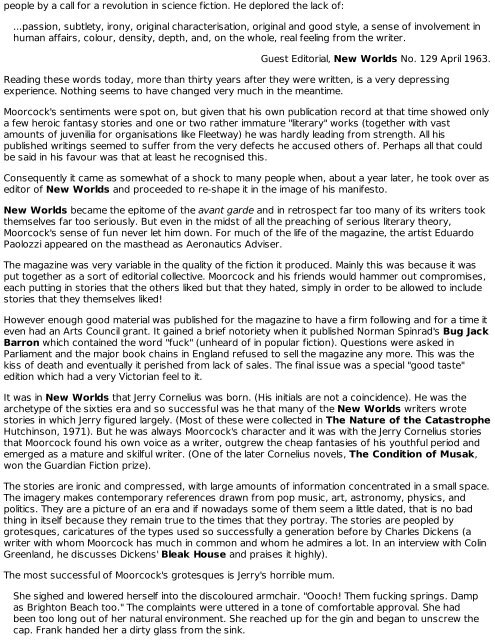Triffids Beard 2 - The Bearded Triffid
Triffids Beard 2 - The Bearded Triffid
Triffids Beard 2 - The Bearded Triffid
Create successful ePaper yourself
Turn your PDF publications into a flip-book with our unique Google optimized e-Paper software.
people by a call for a revolution in science fiction. He deplored the lack of:<br />
...passion, subtlety, irony, original characterisation, original and good style, a sense of involvement in<br />
human affairs, colour, density, depth, and, on the whole, real feeling from the writer.<br />
Guest Editorial, New Worlds No. 129 April 1963.<br />
Reading these words today, more than thirty years after they were written, is a very depressing<br />
experience. Nothing seems to have changed very much in the meantime.<br />
Moorcock's sentiments were spot on, but given that his own publication record at that time showed only<br />
a few heroic fantasy stories and one or two rather immature "literary" works (together with vast<br />
amounts of juvenilia for organisations like Fleetway) he was hardly leading from strength. All his<br />
published writings seemed to suffer from the very defects he accused others of. Perhaps all that could<br />
be said in his favour was that at least he recognised this.<br />
Consequently it came as somewhat of a shock to many people when, about a year later, he took over as<br />
editor of New Worlds and proceeded to re-shape it in the image of his manifesto.<br />
New Worlds became the epitome of the avant garde and in retrospect far too many of its writers took<br />
themselves far too seriously. But even in the midst of all the preaching of serious literary theory,<br />
Moorcock's sense of fun never let him down. For much of the life of the magazine, the artist Eduardo<br />
Paolozzi appeared on the masthead as Aeronautics Adviser.<br />
<strong>The</strong> magazine was very variable in the quality of the fiction it produced. Mainly this was because it was<br />
put together as a sort of editorial collective. Moorcock and his friends would hammer out compromises,<br />
each putting in stories that the others liked but that they hated, simply in order to be allowed to include<br />
stories that they themselves liked!<br />
However enough good material was published for the magazine to have a firm following and for a time it<br />
even had an Arts Council grant. It gained a brief notoriety when it published Norman Spinrad's Bug Jack<br />
Barron which contained the word "fuck" (unheard of in popular fiction). Questions were asked in<br />
Parliament and the major book chains in England refused to sell the magazine any more. This was the<br />
kiss of death and eventually it perished from lack of sales. <strong>The</strong> final issue was a special "good taste"<br />
edition which had a very Victorian feel to it.<br />
It was in New Worlds that Jerry Cornelius was born. (His initials are not a coincidence). He was the<br />
archetype of the sixties era and so successful was he that many of the New Worlds writers wrote<br />
stories in which Jerry figured largely. (Most of these were collected in <strong>The</strong> Nature of the Catastrophe<br />
Hutchinson, 1971). But he was always Moorcock's character and it was with the Jerry Cornelius stories<br />
that Moorcock found his own voice as a writer, outgrew the cheap fantasies of his youthful period and<br />
emerged as a mature and skilful writer. (One of the later Cornelius novels, <strong>The</strong> Condition of Musak,<br />
won the Guardian Fiction prize).<br />
<strong>The</strong> stories are ironic and compressed, with large amounts of information concentrated in a small space.<br />
<strong>The</strong> imagery makes contemporary references drawn from pop music, art, astronomy, physics, and<br />
politics. <strong>The</strong>y are a picture of an era and if nowadays some of them seem a little dated, that is no bad<br />
thing in itself because they remain true to the times that they portray. <strong>The</strong> stories are peopled by<br />
grotesques, caricatures of the types used so successfully a generation before by Charles Dickens (a<br />
writer with whom Moorcock has much in common and whom he admires a lot. In an interview with Colin<br />
Greenland, he discusses Dickens' Bleak House and praises it highly).<br />
<strong>The</strong> most successful of Moorcock's grotesques is Jerry's horrible mum.<br />
She sighed and lowered herself into the discoloured armchair. "Oooch! <strong>The</strong>m fucking springs. Damp<br />
as Brighton Beach too." <strong>The</strong> complaints were uttered in a tone of comfortable approval. She had<br />
been too long out of her natural environment. She reached up for the gin and began to unscrew the<br />
cap. Frank handed her a dirty glass from the sink.


